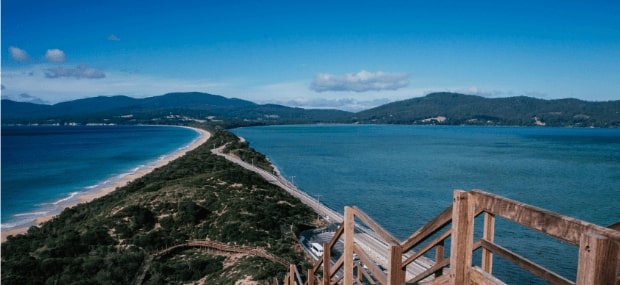Why Study In Tasmania (TAS) Australia?

If you're looking for a unique and fulfilling study experience, Tasmania might be your perfect match.
This beautiful Australian island offers a fantastic mix of things to love. You'll find high-quality education, breathtaking scenery, vibrant cities, and a welcoming community.
From its clean air to affordable living, Tasmania provides an ideal environment for students to thrive. If you're ready for an unforgettable journey of learning and adventure, keep reading to discover why Tasmania should be at the top of your list.
1. Study in a Special Environment
Tasmania offers unique and in-demand areas of study that align with its strengths and environment.
Explore the mysteries of Antarctica with dedicated research programs, become an expert in maritime logistics and management, design ships for global industries, or focus on protecting our planet with environmental science degrees.
With smaller classes, you'll receive personalised attention from professors who are leaders in their fields.
2. Gain Experience, Build Your Future
Tasmania lets you combine studies with work experience to develop real-world skills and gain a competitive edge. After just one year of study, exploring visas like the Skilled Regional Visa can open doors to your future.
This pathway and Tasmania's supportive environment foster opportunities for skilled graduates to potentially launch a fulfilling career in Australia.
3. Choose the University that Fits You
-
University of Tasmania: With campuses in the vibrant capital, Hobart, and the charming city of Launceston, experience diverse learning environments and a wide range of programs from health sciences to business and the arts.
- Australian Maritime College: Located in Launceston, become an expert in the maritime industry with specialised programs that prepare you for a dynamic global field filled with exciting possibilities.
4. TasTAFE: Skills for Success
Choose from over 370 accredited courses at TasTAFE, a leader in hands-on vocational training.
Learn from experienced instructors in hospitality, tourism, construction, and healthcare using top-notch facilities. TasTAFE's close industry connections mean opportunities for internships and strong job prospects for graduates, preparing you for a rewarding career path both in Tasmania and beyond.
5. Enjoy the Tasmanian Lifestyle
Tasmania's cities are safe and welcoming, with a thriving arts scene, festivals like Dark Mofo, and delicious local eats.
Breathe the world's cleanest air and explore stunning national parks like Cradle Mountain and Freycinet National Park. Escape the traffic and pollution of big cities with easy-to-use public transport and the option to explore at your own pace by bike or on foot.
6. Stretch Your Budget Further
Tasmania is more affordable than other Australian states, giving you more financial freedom.
Even in charming Hobart, you'll spend less on necessities. Enjoy outdoor adventures like hiking, biking, and kayaking, or explore Hobart's foodie scene with its fresh markets and vibrant cafes without breaking the bank.
7. Connected to the Mainland
Enjoy the island life while having easy flights to cities like Melbourne and Sydney for weekends or longer trips. Experience the best of both worlds – Tasmania's unique charm and the excitement of Australia's vibrant mainland hubs whenever you want a change of pace.
8. Experience Four Distinct Seasons
Tasmania has a temperate climate with warm summers perfect for beach days (December to March, averaging 17-23°C) and cooler winters (around 11°C) ideal for cozying up by a fireplace. This seasonal variety means you'll enjoy outdoor activities year-round with a beautiful change of scenery.
9. Find Your Perfect Home
Tasmania offers various safe and affordable student housing options, with average weekly rents around $350 for a house and $285 for a unit.
Your university's housing service can help you find the right fit in locations from bustling Hobart to beachside suburbs. Prices may vary slightly, giving you options to choose from.
10. Getting Around is Easy
Major cities like Hobart and Launceston have reliable bus networks, making getting to class on weekdays easy.
For weekends and exploring further afield, a car (personal or shared) offers more flexibility to discover hidden beaches and charming towns. Bike paths in cities provide eco-friendly transportation as well.
11. Become Part of a Global Community
Tasmania attracts students from all over the world, creating a diverse and welcoming atmosphere for everyone.
Expand your worldview, make lifelong friends with people from different backgrounds, and build a network that spans the globe.
12. Adventure Awaits
Hike to the summit of Mount Wellington for stunning views of Hobart, explore pristine beaches like those along the Bay of Fires, kayak in turquoise waters, or immerse yourself in Tasmania's wild forests.
Stay active, connect with nature, and create unforgettable memories in this outdoor adventurer's paradise.
13. Celebrate with Festivals and Events
Tasmania's calendar includes festivals celebrating music, arts, food (like the famous Taste of Tasmania!), and culture.
Experience the unique vibe of Dark Mofo during winter, immerse yourself in music at festivals like Falls Festival, meet locals, and discover the island's vibrant community spirit.
14. A Foodie's Delight
Discover farm-fresh produce at markets like Salamanca Market, sample local seafood and wines, and indulge in treats from bakeries and cafes.
Tasmania is a haven for food lovers, offering everything from casual eats to gourmet dining experiences showcasing the island's culinary bounty.
15. It All Comes Together in Tasmania
Experience the ideal blend of world-class education focused on in-demand fields, stunning scenery, affordable living, and a supportive community.
Tasmania is the perfect choice if you dream of studying, exploring, and building a bright future in a unique and unforgettable setting unlike anywhere else.
Useful Topics to Explore:
How useful was this post?
Click on a star to rate it!



